The Works of the Rev. Richard Watson (8 vols.)
Digital Logos Edition
You’ll likely also be interested in Richard Watson's Biblical and Theological Dictionary.
Overview
Richard Watson is considered to be one of nineteenth-century Methodism’s most influential theologians. A prolific writer, preacher, and theologian, Watson had a profound impact on Methodism in both America and Britain. After converting from Calvinism, Watson set out to write what would become the standard Methodist theological textbook for the next 50 years. His Theological Institutes, the first attempt to systematize John Wesley’s and Methodist doctrine, has become a cornerstone reference for Methodist and Wesleyan studies, influencing Thomas Ralston, Samuel Wakefield, and countless contemporary theologians. No theological study of Methodism or Wesleyanism can be conducted without running across the work of Richard Watson.

- Copious sermon notes and full sermons from the renowned Methodist preacher
- Extensive theological coverage in his essential systematic theology
- Classic Wesleyan commentary on Mark and Matthew
Mr. Watson’s works have contributed largely to raise the tone of Methodist literature to a much higher standard than it had ever reached before.
—George John Stevenson (1818–1888), Methodist historiographer
- Title: The Works of the Rev. Richard Watson
- Authors: Richard Watson, Thomas Jackson, and Edward J. Brailsford
- Volumes: 8
- Pages: 3,889
- Resource Types: Sermons, Biographies, Systematic Theologies, Commentaries
- Christian Group: Wesleyan/Methodist
- Topic: Theology
- Memoirs of the Life and Writings of the Rev. Richard Watson by Thomas Jackson
- Sermons and Sketches of Sermons by Richard Watson
- The Life of the Rev. John Wesley by Richard Watson
- Conversations for the Young by Richard Watson
- Remarks on the Eternal Sonship of Christ by Richard Watson
- Theological Institutes by Richard Watson
- An Exposition of the Gospels of St. Matthew and St. Mark by Richard Watson
- Richard Watson: Theologian and Missionary Advocate by Edward J. Brailsford
This title is included in the following collections
You can save when you purchase this product as part of a collection.
Logos 8 Methodist & Wesleyan S...
$349.99$349.99Logos 9 Methodist & Wesleyan S...
$349.99$349.99Logos 8 Methodist & Wesleyan G...
$849.99$849.99Logos 7 Methodist & Wesleyan G...
$849.99$849.99
- $849.99
- $1,499.99
- $1,499.99
- $1,499.99
- $2,999.99
- $21,749.99
- $24,999.99
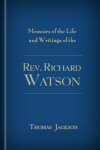
Memoirs of the Life and Writings of the Rev. Richard Watson
- Author: Thomas Jackson
- Publisher: B. Waugh and T. Mason
- Publication Date: 1834
- Pages: 488
Written immediately after Richard Watson’s death with the assistance of many of his immediate friends and family members, Thomas Jackson’s Memoirs of the Life and Writings of the Rev. Richard Jackson presents the earliest and most direct biography of Richard Watson. Containing copious extracts from official and unpublished documents, this lengthy biography is the original and authoritative source for studying Watson and his relationship with Methodism in its making.
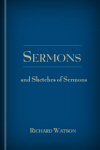
Sermons and Sketches of Sermons
- Author: Richard Watson
- Publisher: John Mason
- Publication Date: 1834
- Pages: 959
Richard Watson was a preacher of highest acclaim in his day. In his Sermons and Sketches of Sermons, the single-volume compilation of the original three-volume body of sermons, Watson’s pulpit expertise shines through, proving his commitment to pastoral work above academics. Through these 51 sermons, you’ll see why Watson has been lauded as the “Chrysostom of Wesleyan Methodism,” and experience the union of his pastoral work with his theological prowess in the course of its contributions to Methodist theology.
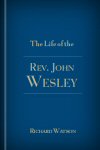
The Life of the Rev. John Wesley
- Author: Richard Watson
- Edition: Seventh
- Publisher: John Mason
- Date: 1858
- Pages: 556
Richard Watson’s Life of the Rev. John Wesley has been a standard book in Methodism ever since it was first published in 1831. Consulting many of the unpublished papers and works of Wesley’s time, Watson corrects numerous misrepresentations produced by earlier biographies and draws the history of Wesley’s theological thought over the course of his life. Perhaps the most-read biography of Wesley in the nineteenth century, The Life of the Rev. John Wesley paved a strong foundation for Wesleyan identity among the laypeople.
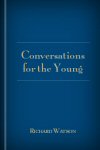
Conversations for the Young
- Author: Richard Watson
- Publisher: J. Emory and B. Waugh
- Publication Date: 1832
- Pages: 311
Written three years before his death, Watson’s Conversations for the Young provides an introduction to the study of the Bible for youth and young adults—especially those of little education. The principles help readers to “read, mark, learn, and inwardly digest” the text of the Holy Scriptures.
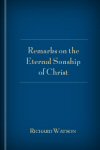
Remarks on the Eternal Sonship of Christ
- Author: Richard Watson
- Publisher: T. Cordeux
- Publication Date: 1818
- Pages: 93
When Adam Clarke had published his famous and much-needed Wesleyan Commentary on the Holy Bible, controversy over Methodist Trinitarian theology ignited over his interpretation and application of Jesus’ “sonship” and the meaning of “Son of God.” The debate lasted decades and resulted in new movements within the Methodist world, including the formation of the Methodist Unitarian Movement in 1818. Around the same time, Richard Watson responded to the cry for a more orthodox clarification of Clarke’s commentary and the New Testament’s use of “Son of God.” This document is Watson’s response to the situation and his interpretation of the meaning of the New Testament on the sonship of Christ.
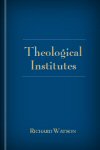
Theological Institutes
- Author: Richard Watson
- Editor: Thomas O. Summers
- Publisher: Stevenson & F.A. Owens
- Publication Date: 1857
- Pages: 786
First published in 1823 in four volumes as the first attempt to systematize John Wesley’s theology, Watson’s Theological Institutes was the first Methodist/Wesleyan textbook for systematic theological studies and remained a primary text for over 50 years after his death. Influencing and guiding the later systematic theological work for Methodist theology, Watson’s Institutes is a must-read theological guide for the development of Methodist doctrine. In this later one-volume edition, Thomas Summers corrects frequent, but minor, errors in Scripture quotation, adds breath and accent marks to Greek words, and provides Scripture citations where originally omitted. Indexes for Scripture citations, Greek terms, and analytical terms (proper nouns and theological terms) have also been included.
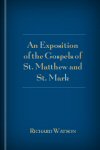
Intended to be a commentary on the whole New Testament, which intended to especially interpret Romans and Hebrews for the Methodist church, Watson’s commentary was interrupted by his death in 1933. Published posthumously, Matthew and Mark were the only complete NT books commentated on. In them, Richard Watson demonstrates sincere and pious devotion to the biblical text as he boldly expounds the Scripture with a shepherd’s heart and a theologian’s mind.
Richard Watson’s exposition of Matthew, Mark, and other portions of Scriptures evinces a talent for simple, yet thorough and profound, exegesis superior to that of Clarke and Benson, and remains a noble fragment of his projected exposition on the entire New Testament.

A biography detailing the life and ministry of Richard Watson. Brailsford offers an overview and insight into Watson’s life, examining his childhood, his personality, and person, and the lasting impact his work and theology had on Methodism.
Edward J. Brailsford (1841—1921) was a Wesleyan Methodist preacher who ministered in Edinburgh and Glasgow.
Richard Watson (1781–1833) was a British Methodist theologian and missionary advocate. Considered one of nineteenth-century Methodism’s most important figures, Watson was a prolific writer and preacher. He served as the secretary to the Wesleyan Missionary Society from 1821 to 1825. His Theological Institutes were considered institutional standards for years, and was the first attempt to systematize John Wesley’s theology and Methodist doctrine.
Reviews
1 rating

Christopher Engelsma
10/18/2016
Pity this doesn't include his dictionary. http://www.studylight.org/dictionaries/wtd/marcelo acacio pacheco
7/4/2015
está faltado obras teologicas como esta aqui no brasil seria muito bom se a logos investisse aqui no brasil trazendo as grandes obras teologicas classicas para nos cristãos brasileiros.
Floyd Johnson
8/15/2012
Though I do not know much of Richard Watson's work - I am familiar with his "Theological Institutes" found in Volume 12. I have long argued that this work should be included in the LOGOS Library, along with Pope's "Compendium of Christian Theology", published some time ago by LOGOS. The thoroughly Christian, the "Theological Institutes" is a classical Wesleyan-Arminian theology which focus on the philosophical arguments for this position. I would recommend it be read by all believers - whatever color of hat they may wear. Though dated, the books are clearly written and approachable. The only reason for the four-star review is that I am unfamiliar with the remainder of Watson's work.